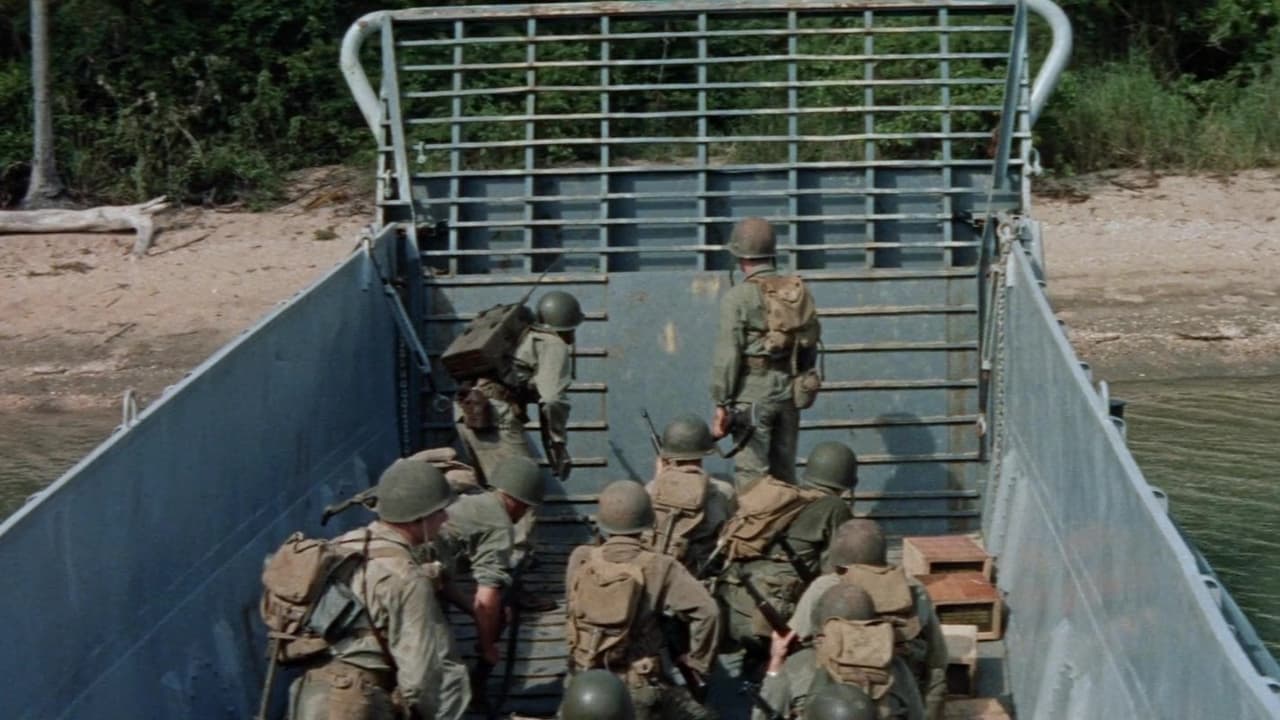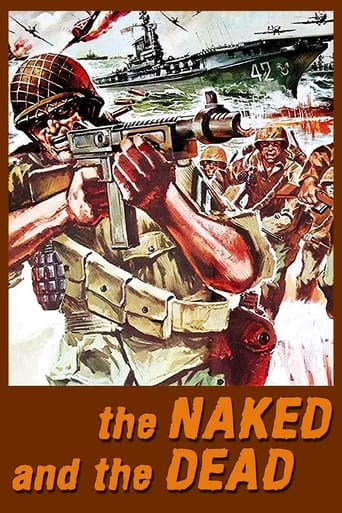



Don't listen to the negative reviews
Clever and entertaining enough to recommend even to members of the 1%
View MoreTells a fascinating and unsettling true story, and does so well, without pretending to have all the answers.
View MoreThe story, direction, characters, and writing/dialogue is akin to taking a tranquilizer shot to the neck, but everything else was so well done.
View MoreThe novel "The naked and the Dead" is often considered impossible to adapt to a movie, and it certainly was in the 50s, when every other sentence spoken in the book had to be censored, and it was desirable to alter the ending, not just by killing "the bad guy" and allowing "the good guy" to survive, but also by changing the meaning of the ending from Meaninglessness to Heroism.But this is not even the main reason why I dislike the movie. The main reason is that it completely destroyed the characters. In the book there are NO good guys and bad guys; you may hate Croft but you are aware that many characters are still alive just because of him; and Hearn is by no means such a perfect guy, just an ordinary one.Many events from the book happen in the movie too, but without giving them any meaning or any accompanying emotions. For example, Gallagher receives the letter saying that his wife died. And - nothing of it; we don't even get to see his reaction. But in the book he keeps receiving letters from her, tormenting him into believing that she is still alive. Another example: we never get to feel the hardships of going through the thick jungle for a whole day, which occupy much of the book; it is much easier to include a snake bite instead to show us how the jungle is brutal.Let us hope that once we will see a movie that will capture this great book more honestly...
View MoreThis movie seems like one made because of a much hailed and overrated author, in which the director has the nerve to actually make changes to give a novel look at war and life.The book is exactly like a Hollywood movie. Bullets cannot find bad guys, and if you're evil enough, you live forever. We get this from 99% of films. No wonder Americans bend over backwards to be sadistic. In short, that's about all the book is. Very Hollywood.This movie gives a fresh look for the viewer. Instead of the mass depression we're used to, we get an intelligent look at war. The hero is caught between two equally vicious men, one higher in rank, and one lower. Much of the rest of the movie deals with the characters, like in the older war movies.Not to give away the ending, but you will be shocked and surprised. The film still shows the horror and depravity of war without getting preachy, as many later films did.
View MoreRaoul Walsh's films of the 1950's are uncharted territory, much like the South Pacific island where most of the action in Naked and the Dead unfolds. Many of the films aren't available or are rarely seen. Of those that are, I'm only familiar with a series of Clark Gable films serving mostly as an excuse for Walsh, through Gable, to flaunt his reactionary values, missing body parts, and old-sea-salt virility. In none of these films was there any indication that Walsh could deliver something of the scale and complexity of Naked and the Dead, which more than equals mid-period lulus like The Roaring Twenties. Walsh was an arbitrary choice to film Norman Mailer's novel. Mailer wrote the book as a young man with a name to make and awards to win. In 1958 Walsh had nothing left to prove to anyone -- even when he was Mailer's age, I can't imagine him going for Mailer's bludgeoning tactics. Though I'm no Mailer acolyte, you do miss his chutzpah at first, as the movie has a laid-back feel more appropriate for a beach volleyball film. An amphibious landing that brings echoes of D-Day is carried out near the beginning of the film, during which we're told that 130 men have died, but we don't see a single limb get blown off. We just get a couple shots of smoke rising out of the forest as the ships land. You start to worry that Walsh, like in those Errol Flynn war films of the 1940's, has brought his crew down to Pasadena to film in a state park with three potted palm trees.However, the interplay between the actors -- Walsh favors long-takes with eight or nine guys just shooting the s--t, stirring hooch and whining about their superiors -- is enough to keep you watching. Eventually it dawns on you that Walsh has seen much more of life than Mailer. He is long past the need to sadistically linger on the more dramatic moments of war. You can feel Walsh feeding off his group of actors, basking in their youth while lovingly depicting their trials of life, the same ones he underwent half a century ago. The approach is very much like Scorsese's in The Aviator in its tendency to concentrate on hope and promise, a refusal to wallow in the ugly. Right to the end Walsh resists the impulse to ratchet up the tension -- like a conductor guiding his music with a steady pulse, the movie just keeps plodding along, and a horrific death is given no more emphasis than a running joke about Raymond Massey's character getting a daily bunch of flowers. In the final hour, his method pays off. The landscapes open up in spectacular fashion, just as each character moves inexorably towards an action that will define them within time like a pin in a map. An authenticity grips the movie and won't let go. The way Walsh has of letting major events happen offscreen begins to feel ominous and evocative of unseen forces, worthy of Jacques Tourneur, and the underpopulated battles take on massive grandeur in the imagination. A culminating sequence featuring rows upon rows of tanks and mortars battering an invisible enemy is what all directors want to achieve -- a moment that goes beyond words into an expression of pure cosmic power, millenia of sorrow and rage blending into a firework display for the gods. Think of this as The Naked and the Dead, and you'll be disappointed. Think of it as what Terence Malick wanted to do with The Thin Red Line, and you will see exactly where he went wrong, and where Walsh succeeds. Walsh blows the world up good, but unlike the lords of war, he does it for love, not personal gain. And he takes us all out equally.
View MoreReportedly, Norman Mailer's best-selling novel was distilled and sanitized for the screen (what book isn't?!) Many people blame this for the rather weak resultant film. The film IS fairly weak, but the adaptation can hardly be the sole cause. "From Here to Eternity" and "Peyton Place" are just two movies adapted from adult novels that were made around this time and were referred to as "unfilmable", yet the end results were magnificent. This film concerns hard as nails, embittered Ray as an amoral Sergeant who's currently in charge of a motley troop of men in the South Pacific islands during WWII. Massey co-stars as a stern General who thinks of men as little more than beads on an abacus as he tries to figure out the strategies and percentages of war. His assistant Robertson clashes with him on various points and, after one particular battle, finds himself on a deadly mission alongside Ray and his band of not-so-merry men. Ray gives an okay performance in the film, but lacks the sort of leading man magnetism that could have put this over better. Robertson is thoughtful in his part, but doesn't really shine. Massey has a strong part with many nice moments. Several well-known TV and movie actors can be found in the troop including the always reliable Jaeckel, Best (who would later make a fool of himself weekly on "Dukes of Hazzard"), Campbell (famous for a guest role on the original "Star Trek" series), the ubiquitous Jones (who has an embarrassing role as a lovesick soldier) and Rat Pack comedian Bishop (who actually gives a nicely balanced performance.) There are some horrible flashbacks featuring various women. Ray's details his ludicrously presented relationship with trashy Nichols who laughs loudly and inappropriately at the end of it. Robertson has a dream involving a pallette of society girls he apparently had dabbled with, sometimes two at a time. Real life stripper St. Cyr makes a none too impressive appearance in the beginning of the film, inspiring Jones tremendously. The worst fault the film has is it's pedestrian nature. There is very little excitement generated throughout, even when arresting events are occurring. The film suffers from tiresome shots of the soldiers marching, climbing, walking, skulking..... A lot of the momentum gets lost along the way. This is countered somewhat by several bouts of unfunny physical comedy, heated arguments among the men and moments of drunken loudness. There is just a general unfocused quality in the film, possibly caused by shifts in the direction of the plot from the novel. What's worse is that in two hours of film, most of the men don't take their shirts off at all and when a few do it's in long shots. Maybe that's what was missing! The music does little to enhance the film. Bernard Herrman (who did such miraculous things to Hitchcock films) flounders here with unmemorable work. It's not the worst war film ever made, but truly falls short of being a great one.
View More